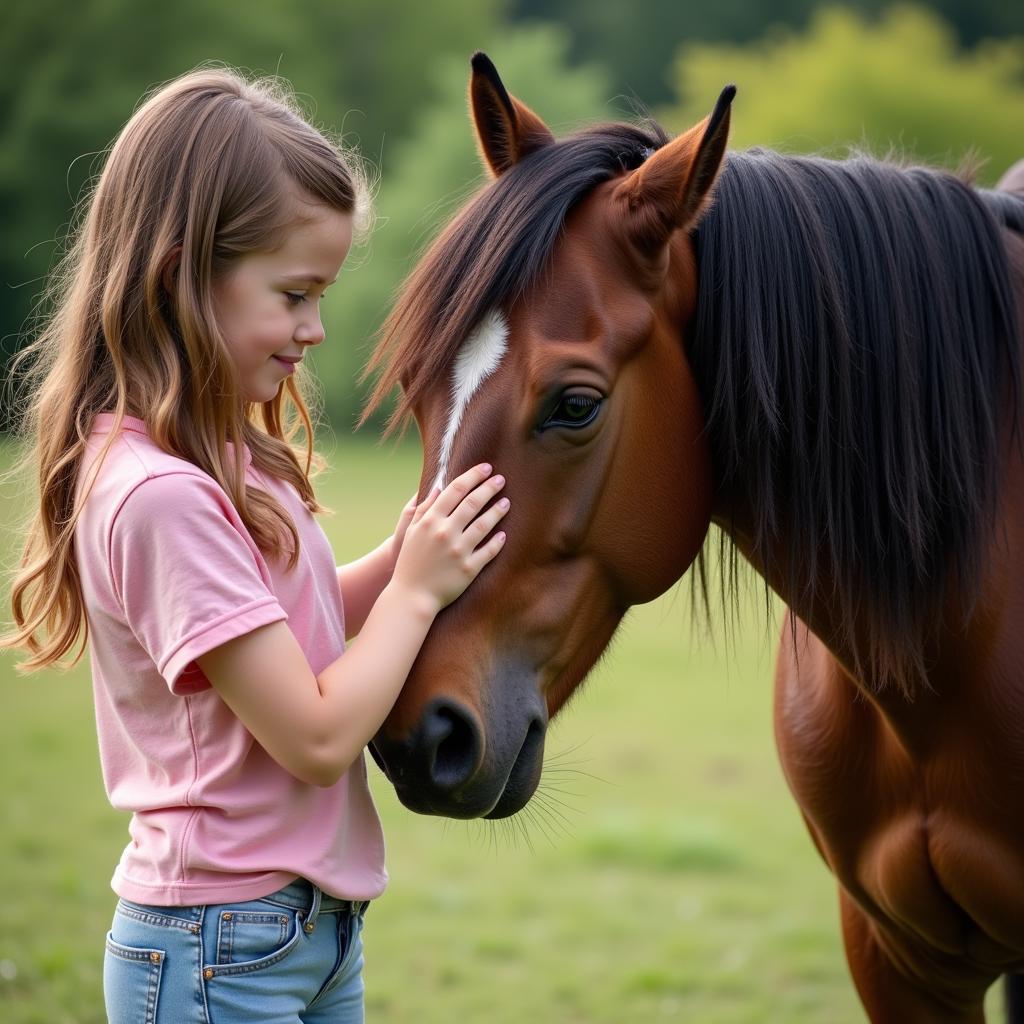The term “Quiet Horse” is often used to describe an equine partner that exhibits a calm, predictable, and willing temperament. These horses are generally less reactive to stimuli, making them ideal for a variety of riders and disciplines. But what truly makes a horse quiet? Is it simply genetics, or is it a blend of breeding, training, and environment? Let’s delve deeper into the world of the quiet horse.
Deciphering the Quiet Disposition
While some breeds are inherently known for their calm temperaments, like the quiet arabian horse for sale, it’s important to remember that each horse is an individual.
The Role of Genetics
Genetics undoubtedly play a significant role in a horse’s temperament. Certain breeds have been selectively bred for generations to enhance specific traits, including a quiet nature. For instance, draft breeds were historically bred for strength and docility, making them suitable for pulling heavy loads. Similarly, many stock horse breeds known for their “cow sense” often exhibit calmness and level-headedness, especially in high-pressure situations.
The Power of Training
However, breeding is only one piece of the puzzle. Even a horse with a genetically predisposed calm temperament can develop behavioral issues without proper training. Consistent, positive reinforcement methods are crucial for building trust and shaping a horse quiet and responsive nature.
Consider this quote from renowned horse trainer, Sarah Williams: “A quiet horse isn’t born, it’s made. It’s about building a language of understanding through clear communication and consistent expectations.”
The Impact of Environment
Furthermore, a horse’s environment plays a vital role in shaping its behavior. A stressful or chaotic environment can make even the calmest horse anxious and reactive. Conversely, a calm, predictable routine, along with adequate turnout and socialization, can foster a sense of security and contentment.
Identifying a Quiet Horse: Beyond the Breed Stereotype
While certain breeds might be generally known for their calm demeanors, it’s essential to assess each horse individually. Here are some key indicators of a quiet horse:
- Relaxed Body Language: A quiet horse will typically display relaxed muscles, a soft eye, and a lowered head carriage. Their ears might be slightly forward or relaxed to the sides, indicating attentiveness without tension.
- Even Temperament: They are generally less reactive to sudden noises or movements and tend to remain calm in new environments or when being handled by strangers.
- Willingness to Work: A quiet horse often exhibits a willingness to work with their handler, showing patience during training sessions and a desire to please.
 Gentle Grooming Session
Gentle Grooming Session
Training for Quietness: Building a Foundation of Trust
Training a horse for quietness requires patience, consistency, and a deep understanding of equine behavior.
Positive Reinforcement: The Cornerstone of Quiet Training
Positive reinforcement methods, such as clicker training or reward-based systems, are highly effective in promoting calm behavior. These methods focus on rewarding desired responses, strengthening the bond between horse and handler while minimizing stress and anxiety.
Desensitization and Counter-Conditioning: Addressing Fears and Anxieties
If a horse exhibits fear or anxiety towards specific stimuli, desensitization and counter-conditioning techniques can be employed. These methods involve gradually introducing the horse to the source of their fear at a low intensity, pairing it with positive reinforcement until the horse no longer reacts fearfully.
The Quiet Horse: A Valuable Partner for All Disciplines
A quiet horse is an asset in any discipline, whether it’s trail riding, dressage, or therapeutic riding. Their calm nature and willingness to work make them suitable for riders of varying skill levels, fostering a safe and enjoyable riding experience.
Remember, finding the right horse is a deeply personal journey. While this guide provides insights into understanding and training for quietness, seeking guidance from experienced equestrians and trainers is invaluable in navigating the path to finding your perfect equine partner.
FAQs about Quiet Horses
1. Are quiet horses always slow?
Not necessarily. While some quiet horses may have a more laid-back personality, others can be quite athletic and energetic. Quietness relates to temperament rather than speed or athletic ability.
2. Can any horse become quiet with the right training?
While training plays a significant role in shaping temperament, some horses may have inherent anxieties or reactivity that require more specialized training and management.
3. What are some breeds known for producing quiet horses?
Breeds like the American Quarter Horse, Arabian, and Morgan are often praised for their calm dispositions. However, individual temperament can vary greatly within any breed.
4. How can I tell if a horse is genuinely quiet or just well-trained to appear that way?
Observing the horse’s body language in different situations, especially when faced with unfamiliar stimuli, can provide valuable insights. A genuinely quiet horse will generally remain relaxed and composed.
5. Is a quiet horse suitable for a beginner rider?
A well-trained, quiet horse can be an excellent choice for a beginner rider, offering a safe and predictable mount. However, proper instruction and guidance from an experienced equestrian professional are always recommended.
Need Help Finding Your Quiet Equine Partner?
Finding the perfect horse is a significant decision. At Justus Horses USA, we understand the importance of matching you with an equine partner that aligns with your riding goals and experience level. Contact us today at 0772127271 or [email protected]. Our team of experts can help you navigate the world of horse ownership, offering guidance and support every step of the way. We are located at QGM2+WX2, Vị Trung, Vị Thuỷ, Hậu Giang, Việt Nam, and our customer service team is available 24/7 to assist you.
Looking for riding inspiration? Check out our article on quarter horse dressage for a unique perspective on this elegant discipline. And if you’re searching for the perfect gift for the horse lover in your life, explore our christmas costume ideas for horses for some festive fun!